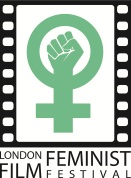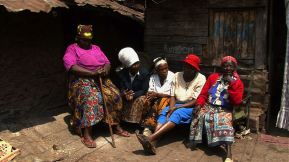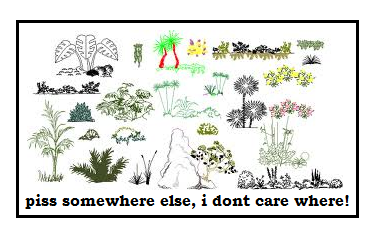By Witchwind
These 4 days of feminist film festival in London have brought me back the hope, the sisterly, positive and creative energy that Patriarchy and men were stealing away from me for the last few months of activism. Being in the company of radical feminists from different parts of the world and spending entire days watching feminist films about women bravely fighting against men’s violence, bonding together, pushing the boundaries of their captivity in the male system and creating new worlds of their own, was enough to fill me with renewed joy and fire. The number and quality of films shown was truly impressive, most of which I had not seen before. I was amazed by how refreshingly radical some of the films and debates were, the organisers had done a great job at selecting the films and panellists from many different backgrounds.
The clear-cut radicalism of certain films, the unflinching sisterhood, love of women and separatism from men conveyed during some of the screenings contrasted somewhat with the more liberal politics of the festival however, since the choice was made to hold the festival in a mainstream cinema where women-only screenings were impossible. I’m tempted to ignore this aspect to avoid negativity and simply focus on what made me happy, as this did not in itself abate my exhilaration and joy of seeing the films, participating in women’s culture and meeting with radical lesbian feminists. Yet it raises important political issues which are true for any event that calls itself feminist, so I will discuss it briefly.
The fear of reprisals for excluding men from our spaces is a reasonable one given that being isolated from the wider feminist community, cut from access to venues, being subjected to public libelling, vile harassment and receiving death threats are very possible risks, intended to destroy our resistance to male supremacy and drive women out of feminism. On the other hand, the immediate and long-term effects of opening feminist events to men are – amongst others – to dull down our resistance, to give men access to our precious few tools of liberation (which most then use against us) perpetuate fearful deference/ trauma-bonding to men and contempt for ourselves and other women, perpetuate the incapacity to think or act outside of male parameters for thought and action (which are inherently women-hating and destructive), prevent genuine female bonding, promote divisiveness, etc – basically, to maintain men’s control over us, some way or another.
To create a safe, women-only and women-centred space where we can go to the end of our thoughts is necessary so that we find the lucidity, courage, force and solidarity we need to resist men and build a world in our own terms. How is this possible and what message about feminism are we conveying to women, if for instance, men are allowed to be present during the screening and discussion of Lesbiana: A Parallel Revolution on lesbian separatism? It is quite significant that during the panel discussion following this film, a panellist named Julia Long was condemned and accused of sabotage after and during the festival for having kindly – and bravely – invited men to consider leaving the room, out of respect for women’s autonomous spaces (her response to an attack in the Guardian can be found here). As if the political conclusions and implications to be drawn from the film on lesbian separatism were respectable so long as they remained abstract, something from the past and disconnected from our own reality, here and now. That’s the thing: fear to displease men or male-defined “wider audiences” will always be thought and action-terminating, because that is the very purpose of oppression. In patriarchy (and there is no other system outside of it) male-identification and male presence are antinomic to freedom, female bonding and liberation. I know no other feminism than that of separatism, as it is the sine qua non condition for our liberation.
I understand how difficult it is to organise such a big event but I do hope the LFFF will be women-only next year. That said, men are very welcome to donate the extra resources they earn from stealing, exploiting, raping and murdering women, to support the festival – but when it comes to actually helping us getting things done without invading the few spaces we manage to build for ourselves or using feminism as another way to emotionally or sexually abuse women, surprise surprise, there aren’t so many left.
Anyway, back to the films. From a radical feminist perspective, my awards go to the three following films: Lesbiana: a Parallel Revolutionby Myriam Fougère, 2012; Kung Fu Grandmaby Jeong-One Park, 2012 and the feminist classic A question of Silenceby Marleen Gorris, 1982.
Lesbiana: A Parallel Revolution, was the film that opened the festival on Thursday evening, a UK premiere, and it was an honour to be able to attend the screening and panel discussion.
(Picture from lesbiana-film.com)
As Femi Otitoju said, who introduced the film before its screening; “if you were there, you’re going to love this film. If you weren’t there, Lesbiana is going to make you wish you were there”. I wasn’t there, and it definitely made me wish I were there. Lesbiana was a delicious and wonderful moment of discovery of the many worlds that Lesbian feminists created during and after the women’s revolution in the 70’s and 80’s.
“A parallel revolution was born out of the feminist movement of the 1970’s, coming to an end around 1995. Filmmaker Myriam Fougère takes us on a journey to meet the lesbian writers, philosophers and activists who were key players in creating a revolutionary sisterhood. From Montréal to Texas, by way of New York, Myriam encounters lesbians who chose to live only among women. This marginal yet international movement is brought to life through archival footage and photographs, and evocative interviews with these courageous women, many of whom are now in their seventies and eighties.” (Summary on lesbiana-film.com).
This film is the result of more than 20 years of footage of lesbian feminist music festivals, demonstrations, conferences, women’s lands, gatherings, women’s bookstores, lesbian art, dozens of interviews and roughly 200 photos from then and now filmed and edited by Myriam Fougère: and the final cut is beautiful. Her voice occasionally commenting, she takes us from place to place, year to year to share with us her experience and the experiences of many other women of the parallel lesbian revolution: it was a gift to be able to hear and see all these foresisters’ testimonies. I remember amongst others the interviews of Marilyn Frye, Sonia Johnson, Julia Penelope, Carolyn Gage, the painter and illustrator for Mary Daly’s Wickedary, and discovered many other lesbian feminists I had not heard of or read – from Quebec, Canada and the United States.
What I also loved about the film is that it managed to represent some of the divisions within the movement without sadistically lingering on in-fights in a way that depressingly casts doom on our capacity to organise together, as sometimes is the case in films or articles – which generally leaves me with a horrible sense of anxiety and pessimism. Quite on the opposite, it felt healthy, positive, very respectful of the different positions and showed how some tensions made the movement grow stronger.
The panel discussion was very lively, and we had the honour to see and hear Myriam Fougère who had come all the way from Québec to the festival! As Julia Long said to Ms Fougère, the film was very moving and generous. I completely identify to the following statement she made: “for me and for a handful of active lesbian feminists that I know in this country at this point, we are used to being quite heartbroken, enraged, we’re used to being exhausted, and we’re used to being isolated even in the wider feminist community. We’re not often used to be quite overwhelmed and overjoyed, and that’s how I feel seeing that”.
This film reminded me of the time when shortly after becoming radical lesbian feminist, a whole new world of women’s culture, writings, art, songs and communities suddenly opened up to me. It was electrifying. I discovered we were a people and that we had a culture, history and spirituality that belonged only to ourselves, spanning back to millennia – one that men did all in their power to erase, destroy, shame and annihilate – but it was still alive. It made me feel strong, for the first time in my life I felt part of something, I had found myself and my place, even though it was just a beginning. It made me feel proud to be women more than ever before, and especially, it helped me to imagine a world and relationships beyond the male system of sadism and subordination. It really felt like a parallel world.
I was inspired by the spontaneity and daring of the women interviewed. They needed houses? They built them! They wanted music of their own? They organised women-only festivals and learned how to do sound engineering! Seeing this moved me to decide to build my own house too, and not to wait any longer to start these women-only workshops I’ve been wanting to do for ages. After all, why shouldn’t I? Finally, Lesbiana promotes separatism better than any long-winded demonstration. Several women told me during discussions about the film that it made them want to dump their boyfriends immediately and start a women’s commune!
Now to the next film, Kung Fu Grandma, by Jeong-One Park. Oh what a film!
(picture from londonfeministfilmfestival.com)
It is a short documentary set in Kenya, in the slums of Korogocho (I don’t like this word but it is the term used in the film). In this area young men frequently target old women to rape them, because, according to their own sayings and to those of the elderly women, the elders are the few women not to be contaminated by HIV or not to be owned by men, as they usually outlive them. Although it was not stated in the film, the raping and then infecting of elderly women with HIV immediately struck me as a deliberate logic of men expanding the destruction and killing of women to those not yet completely destroyed, a logic which clearly qualifies as male-orchestrated genocide of women (see Diana Russel, Aids as mass feminicide).
In this context, the documentary follows the everyday lives of a group of elderly women who form part of a self defense Kung Fu class, so they can learn to defend themselves from the rapists and no longer be afraid to go out by themselves. I absolutely jubilated to watch them kick, punch, scream, shout “we are brave” and stomp together in circles. Their courage, wisdom, lucidity and humanity within the inhumanity of their condition shine and irradiate the film. The way they care for each other deeply and the sincere solidarity between each other is palpable and very moving. I immediately felt part of it, felt close to these women and where they lived, and identified to these experiences of ancient sisterhood. The beauty of who they were made the place look familiar and beautiful, as when you travel to somewhere and you become attached to the place because of the memories of the people you met. One scene that stayed in my mind was where they walk in a group through the street to meet one of their sisters who lives alone, is extremely vulnerable and was recently attacked and almost strangled to death. They appear as imperturbable crones, indestructible, walking slowly but wisely. Their togetherness stands out against the men drifting alone in the path like drunkards. The respect they showed to their sister brought tears to my eyes. No pity, nor misplaced pride in helping out: but an earnest concern and worry for their peer, their sister.
You can sense that the women were very aware of what they were giving to the camera and every word they said felt like a gift, something important from their lives that they agreed to share with us, in a very dignified way.
Funnily enough, the film apparently was not intended to be radical feminist, as the film director herself said she was not active in feminism and that she was simply moved by these women’s stories (although she was probably being very modest about her work). It is very subtle but you do sense the slight neutral, not-too-politically-engaged approach of formulaic documentary style, since she included two interviews of men clearly presented as an “opinion”, their opinion being: yes we have heard of other men who rape + justifications (they took drugs, he had sex drives, we don’t know why they do this) + but we’re good guys. What utter liars.
Interestingly, they all used the terms rape and sex interchangeably when talking about the atrocious acts of rape, torture, murder and deliberate sentencing to death through HIV infection. I immediately thought about the recent discussions on PIV as rape that took place here, here and here. This shows again how, across time and space, rape is always sex to men since rape and sex are the same to them – whereas “sex” as men define and experience it in fact always only means rape for women, once we see the power dynamics, the way it is enforced either through violence or decades of grooming, and the harmful consequences it has on women, which death. The implications of what they say can only be deciphered by a trained feminist eye however, because it is not shot or edited in a way that makes the complicity with the rapists or denial obvious, for example by taking a clear position against what they say one way or another or by explicitly naming it as such (which would basically amount to adding the feminist lens to what is filmed so it is not uncritically reproduced).
However this slight glitch certainly does not take away the beauty and powerful, moving women-centredness of the film, which I wholeheartedly include in the top 3 of the festival.
Finally, A question of silence by Marleen Gorris, Netherlands, 1982.
(pictures from londonfeministfilmfestival.com)
I will not delve too long on this film because there is way too much to say about every single shot, the film being an absolute masterpiece – or perhaps sisterpiece. But in a few words, this is truly the best feminist classic I have ever seen (I have yet to see burning in flames though). The plot, the point of view, the characters, the overall analysis and structure, the shots and editing – all are clear-cut feminist and women-centred, on the top of being artistically brilliant. I thank the organisers for having put their hands on this film and allowing us to discover it (or re-discover it).
Unfortunately there are only very few copies left of the film, but it should be available online by streaming or downloading.
Three women who never met before spontaneously murder a shopkeeper, and are then convicted and imprisoned. The entire film follows the internal evolution of a woman psychiatrist expected to measure the degree of these women’s insanity, so that she can argue for their liberation at court by saying they were crazy and out of their minds, that the act was irrational. She starts off adopting the male perspective that the act of murder is utterly inexplicable, gratuitous and horrendous, and wants to understand the women’s motives for the murder. However, as she goes through the interviews with the women, she is troubled and frustrated by the fact that they have nothing much to say about the murder, have no remorse and don’t even care about it. The interviews are interwoven between shots of the women’s everyday lives in the male world, as secretary, housewife and waitress, where we witness their everyday drudge of being treated as subordinates and slaves by men. The psychiatrist slowly realises that the women are in fact perfectly normal and sane and that their acts and behaviour were rational in the light of this system dominated by men. She comes to identify with the women and see her situation in theirs. We are gradually brought to a completely female perspective, where at the very end, the full farce and scam of the male “judicial” system comes to light, and men are completely ridiculed.
A question of silence felt like a mix between the views of Valerie Solanas and Mary Daly on male society. The way the film stresses the complete meaninglessness and grim boredom of women’s lives in men’s world instantly reminded me of Valerie Solanas’ very first sentence in SCUM manifesto; “Life in this society being, at best, an utter bore and no aspect of society being at all relevant to women, there remains to civic-minded, responsible, thrill-seeking females only to overthrow the government, eliminate the money system, institute complete automation and destroy the male sex” (Valerie Solanas, SCUM Manifesto). Added to the fact that they spontaneously gang up to murder a random male shopkeeper, I felt the same transgressive glee as I did by reading Valerie Solanas’ call for getting rid of men – attacking men directly being the ultimate taboo in patriarchy.
The contempt for and exposure of men’s pompous, vacuous processions by ridiculing them also reminded me of a quote of Mary Daly: “There is nothing like the sound of women really laughing. The roaring laughter of women is like the roaring of the eternal sea. Hags can cackle and roar at themselves, but more and more, one hears them roaring at the reversal that is patriarchy, that monstrous jock’s joke, the Male Mothers Club that gives birth only to putrefaction and deception. One can hear pain and perhaps cynicism in the laughter of Hags who witness the spectacle of Male Mothers (Murderers) dismembering a planet they have already condemned to death. But this laughter is the one true hope, for as long as it is audible there is evidence that someone is seeing through the Dirty Joke”. (Mary Daly, Gynecology).
The other films that I most enjoyed and recommend are:
Taxi sister, by Theresa Traore Dahlberg, Sénegal, 2011
Ladies’ turn, by Hélène Harder, Sénegal, 2012
Audre Lorde: The Berlin Years 1984 to 1992: by Dagmar Schultz, Germany, 2012, website here and trailer here and here
Give us a smile, by the Leeds Animation Workshop, UK, 1983










